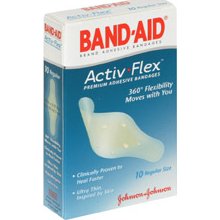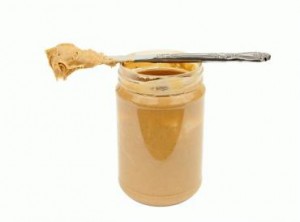
June 12th, 2012 by Dr. Val Jones in Health Tips, True Stories
Tags: Activ Flex, Biopsy, Commercial Product, Dermatology, Hydrocolloid Dressing, Johnson & Johnson, Mole, Nevis, Plastic Surgery, Scar, Wound Care, Wound Healing
1 Comment »
 I’m a dermatologist’s dream – a fair-skinned, freckly person with lots of small moles. The perfect candidate for a lifetime of 6-month skin checks!
I’m a dermatologist’s dream – a fair-skinned, freckly person with lots of small moles. The perfect candidate for a lifetime of 6-month skin checks!
Luckily for me, none of my moles have ever been cancerous. To be honest (please look the other way, dermatologist friends) I have sometimes put off skin checks for fear of being invited to undergo yet another biopsy. I’ve had about 9 procedures so far, and I have the scars to prove it. But this time around, I found a product that really reduced my healing time and scarring. I’m so excited about the results that I don’t care if I need a total-body shave biopsy next year. Bring it on! No one will be able to tell.
It is a little surprising that hydrocolloid gel technology hasn’t been on the consumer market for all that long (I wasn’t able to figure out when this product was launched in retail stores but it seems to me that I’ve only seen it around for the last few years or so). Hydrocolloid dressings are a staple in wound healing in the hospital setting, and I’ve seen marvelous results with pressure ulcer repair in the hands of experienced wound care nurses. The gel essentially creates a moist scaffold for skin cells to fill in defects and divots. The gel absorbs moisture from the skin and wound “oozing” while creating a sterile barrier against dirt and germs. The scab-less healing creates minimal scar tissue and the bandage is hypo-allergenic and incredibly flexible.
The product I used is called ActivFlex premium adhesive bandages (a Johnson & Johnson Band-Aid brand). I’ve seen generic knock-offs on store shelves but haven’t tried them. All I can say is that the experience has been terrific, and it’s such a relief to know that I don’t need to worry about scars from small cuts, burns, or mole biopsies any more. This is a fantastic invention – and I’d love to hear from others (be they dermatologists, plastic surgeons, or regular users of the product) to find out if they’ve had the same luck!
No need to fear skin checks anymore, my fair-skinned friends. You can recover nicely from procedures with a little hydrocolloid help from your local grocery store or pharmacy.
June 9th, 2012 by Dr. Val Jones in Health Policy, Opinion, True Stories
1 Comment »
 A patient was having difficulty swallowing her pills, so her doctor suggested that she might try peanut butter to help the medicine go down. Unbeknownst to the doctor, the patient assumed that this meant that she should mix all her prescription meds into a jar of peanut butter and scoop out a spoonful each day to spread on her toast at breakfast time. This practice was discovered during a home visit by a nurse a few weeks later, who relayed the potential “compliance issue” to the patient’s physician.
A patient was having difficulty swallowing her pills, so her doctor suggested that she might try peanut butter to help the medicine go down. Unbeknownst to the doctor, the patient assumed that this meant that she should mix all her prescription meds into a jar of peanut butter and scoop out a spoonful each day to spread on her toast at breakfast time. This practice was discovered during a home visit by a nurse a few weeks later, who relayed the potential “compliance issue” to the patient’s physician.
Clearly peanut butter is a sub-optimal storage mechanism for prescription medications, and dosing will likely present a challenge in this scenario… However the real message for me is that home visits are critical to understand how (and what) our patients are doing. All the claims data in the world is a poor substitute for the information that can be gathered in a simple house call.
Health insurance companies have gotten this message. Last month I began working for an agency that helps private insurers risk-adjust their Medicare Advantage client pool. In short, private health insurance companies contract with the feds to cover richer benefits for Medicare members who wish to kick in a little extra in premium. The government subsidizes this premium for the members based on their illness severity score (the sicker the patient, the higher the rate paid to private insurers to cover them).
But who knows how sick these members are? Health insurance claims data (diagnosis codes collected over the course of a patient’s lifetime) don’t correlate well with actual illness and current conditions, nor are these codes easy to get one’s hands on in the first place. Multiple previous carriers, incomplete medical records, various specialist physicians with paper charts or EMRs (that don’t talk to one another) all contribute to the poor data quality. So, as expensive a proposition as this is, private insurers are paying independent physicians to make house calls to tease out what’s actually going on with patients.
This process has been eye-opening for me in ways I hadn’t anticipated. First of all, I have a much better sense of how older Americans are actually living their lives by visiting them in their homes. I’ve gotten to know about the importance of family, the value of good caregivers, and the surprising lack of correlation between wealth and happiness. Second, I’ve gotten a sense of primary care quality in rural settings, and how communication break downs occur between patients and physicians. And third, I’ve developed an even deeper appreciation for the complexity of keeping people out of the hospital. Even the most well-intended advice can be “operationalized” in strange and wonderful, peanut-buttery ways.
I thought it might be helpful if I shared my experiences with you via my blog (patient privacy respected always, of course), so that we can explore the intersection between real life scenarios (discovered during house calls) and potential health policy. So stay tuned for more… 😆
January 6th, 2012 by Steve Novella, M.D. in Opinion, True Stories
Tags: Alternative Medicine, Anecdote, CAM, Cancer, Cancer Cure, Claims, Diet, Dr. Ian Gawler, Evidence Based Medicine, Meditation, Science, Treatment
5 Comments »

Dr. Ian Gawler, a veterinarian, suffered from osteogenic sarcoma (a form of bone cancer) of the right leg when he was 24 in 1975. Treatment of the cancer required amputation of the right leg. After completing treatment he was found to have lumps in his groin. His oncologist at the time was confident this was local spread from the original cancer, which is highly aggressive. Gawler later developed lung and other lesions as well, and was given 6 months to live due to his metastatic disease.
Gawler decided to embark on an alternative treatment regimen, involving coffee enemas, a vegetarian diet, and meditation. Eventually he was completely cured of his terminal metastatic cancer. He has since become Australia’s most famous cancer survivor, promoting his alternative approach to cancer treatment, has published five books, and now runs the Gawler Foundation.
At least, that is the story he believes. There is one major problem with this medical tale, however – while the original cancer was confirmed by biopsy, the subsequent lesions were not. His oncologist at the time, Dr. John Doyle, assumed the new lesions were metastatic disease and never performed a biopsy. It was highly probable Read more »
*This blog post was originally published at Science-Based Medicine*
January 4th, 2012 by KerriSparling in Opinion, True Stories
Tags: Blood Sugar, Bolus, Dexcom, Diabetes, Glucose Monitors, Highs, Hydration, Injection, Insulin Pump, Ketones, symptoms, Thirsty, Type 1
No Comments »

High blood sugars come in three different tiers for me: No Big Deal (NBD), Tricky Little Sucker (TLS), and What The Eff (WTE).
No Big Deal (NBD) highs are the ones I see when I first hear the Dexcom BEEEEEEEP!ing. They are the 180 – 240 mg/dL highs, where I’m cruising out of range, but not so far outside that it takes hours to correct. The NBD highs are usually mild in their symptoms (kind of thirsty, sort of tired, maybe wouldn’t have noticed if the Dex hadn’t hollered) are thankfully short in their duration, so long as I’m on the ball about keeping tabs on my blood sugars.
Tricky Little Sucker (TLS) highs are obnoxious pieces of garbage that hang on for hours. These highs are the ones where you hit anything over 200 mg/dL and just ride there for hours. HOURS. Like you can undecorate the Christmas tree and pack up all the holiday nonsense back into the attic and STILL find yourself rolling outside the threshold. They’re the ones that Read more »
*This blog post was originally published at Six Until Me.*
January 3rd, 2012 by DrWes in Opinion, True Stories
Tags: Call, Concerned Patients, Life, Medicine, Operator, Rule-Breaker, Rules
No Comments »

The call never should have been made.
It broke every proscribed rule.
After all, I was not on call. Thanks to the wonders of computer technology, it was very clear that I was being covered by my colleague. And yet, despite this, it came.
“Dr. Fisher, I’m so sorry for calling you at home, but I received a call from Ms. X, the wife of your patient Mr. Y. who said she really needed to speak to you about her husband… she seemed quite concerned and insisted I call you…. I told her I’d see if I could reach you at home… I’m so sorry, but it sounded urgent… I have her number, could I connect you?” Read more »
*This blog post was originally published at Dr. Wes*
 I’m a dermatologist’s dream – a fair-skinned, freckly person with lots of small moles. The perfect candidate for a lifetime of 6-month skin checks!
I’m a dermatologist’s dream – a fair-skinned, freckly person with lots of small moles. The perfect candidate for a lifetime of 6-month skin checks!


 A patient was having difficulty swallowing her pills, so her doctor suggested that she might try peanut butter to help the medicine go down. Unbeknownst to the doctor, the patient assumed that this meant that she should mix all her prescription meds into a jar of peanut butter and scoop out a spoonful each day to spread on her toast at breakfast time. This practice was discovered during a home visit by a nurse a few weeks later, who relayed the potential “compliance issue” to the patient’s physician.
A patient was having difficulty swallowing her pills, so her doctor suggested that she might try peanut butter to help the medicine go down. Unbeknownst to the doctor, the patient assumed that this meant that she should mix all her prescription meds into a jar of peanut butter and scoop out a spoonful each day to spread on her toast at breakfast time. This practice was discovered during a home visit by a nurse a few weeks later, who relayed the potential “compliance issue” to the patient’s physician.










